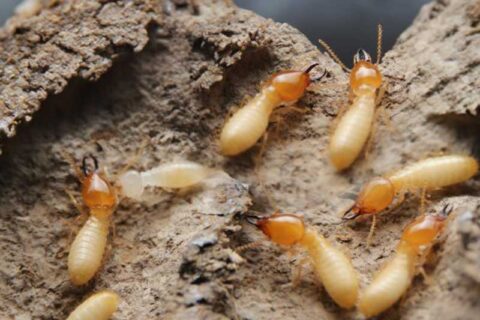Why Do Spiders Bite & Are They All Poisonous?
Spiders are easily among the most disliked of household pests —most of us can’t help but feel a little fear and disgust when one of them suddenly appears next to us while we’re cleaning out the garage or lounging on the couch, but our distaste for spiders isn’t just about the ick factor.
We also worry that these multi-legged creatures could be dangerous to our health. It’s widely known that spiders can, and sometimes do bite human beings. What happens then? How badly can people be harmed by a spider bite?
This is a topic prone to serious confusion, in large part because of the wide range of spiders that exist out there in the wild. To cut through this web of misconceptions, let’s take this opportunity to discuss the nature of spiders and the potential health hazards if any, that they pose.
Spider Bites Are Much Less Common Than You Think
One thing you need to understand about spiders is that they don’t really want to get into a physical altercation with human beings. They prefer to attack small insects they can easily handle. This means that they tend to scurry away when people are around. In fact, you’ve probably noticed this phenomenon yourself—if you’ve ever had the experience of trying to squash a spider in the bathroom, you can attest to the fact that these little critters tend to scamper away quickly at the slightest indication of danger.
Spiders usually bite whenever they feel they’re under attack. This often happens when people accidentally touch them—say, while reaching into the back of the closet for that old shirt. Aside from occurrences like this, though, there’s little chance of getting bitten by a spider. Unlike mosquitos, spiders obtain no nutritional benefit from biting a human being.
Also, a large number of spiders aren’t strong enough to bite human beings with sufficient force to break the skin. As we’ve pointed out, these little pests are engineered for tangling with small insects—when they try to bite us, it’s often about as effective as a puppy trying to chomp on a full-grown Doberman.
For all these reasons, spider bites are really quite uncommon—even in environments where spiders themselves are common.
At this point, a lot of people who have a history of spider bites may feel a little skeptical. What they don’t realize is that many of those spider bites they’re remembering weren’t spider bites at all. Bites from fleas, bedbugs, and similar insects are often mistaken for the handiwork of spiders. Some people develop allergic reactions to household chemicals, resulting in an ugly lesion often mistaken for a spider bite.
All these considerations aside, spider bites do occur. Does a legitimate bite mean a trip to the hospital? Probably not.
What Happens When You Get Bitten?
Many people who get bitten aren’t even aware of it at first. A few hours after the bite, they may develop a small red welt or swelling at the spot of the bite. Sometimes it becomes itchy or painful.
Most of the time, it gets no worse than this. The wound should heal within seven to ten days.
Even if the bite seems like one of the normal types, it’s a good idea to take steps to ensure that it does not become infected. You can do this by thoroughly cleaning the area with soap, then applying an icepack or wet cloth to it. Try to leave the icepack or cloth on for ten-minute periods. You can also ingest some ibuprofen (the stuff in Advil) for pain relief.
In some rare circumstances, however, the spider bite leads to severe complications. The victim may experience one or more highly unpleasant symptoms, such as headaches, nausea, chills, fever, high blood pressure, and even trouble breathing. If this happens, you need to seek medical help immediately. Bring the spider with you if you managed to kill it—this will enable the team to identify it and determine whether it’s one of the dangerous kinds.
Some people can develop allergic reactions even from a “harmless” spider. Small children are also more prone to adverse reactions. Again, if you’re in doubt as to the severity of the bite, it’s best to seek out medical attention.
How Many Dangerous Spiders Are Out There?
In North America, there are more than 3800 known species of spiders (and over ten times that many worldwide). The good news is that almost all of these are pretty harmless to human beings. There are, however, a couple of species in the wild that can cause serious problems for us, and you need to know about them.
The Black Widow
There are actually several different kinds of black widow spiders found in America, but the one you tend to encounter in the western states (including California) is Latrodectus Hesperus. It is also known, appropriately, as the western black widow. The black widow has an abdominal marking—usually red, but, sometimes, yellow—that strongly resembles an hourglass.
The bite of a western black widow can be very toxic to humans, but only rarely does it result in death to the victim. The very young and very old are the most likely to suffer the worst consequences of a bite from one of these creatures.
Only the female of the species is really dangerous. Despite its toxic venom, the black widow is just like the average spider in its unwillingness to attack human beings. It is a nocturnal creature that tends to hide away in secluded areas where it can build its webs in peace. Its preference is to run away from human intruders—but it can bite if someone accidentally brushes against it.
What happens when you get bitten by a black widow? The initial bite isn’t really painful—but matters can start worsening in no time, as the venom begins circulating throughout the bloodstream. Within a few hours, the victim can experience severe pain around the bite area, muscle cramps, nausea, and vomiting. Sometimes the victim’s condition deteriorates to the point where they experience convulsions and loss of consciousness. Without treatment, symptoms may persist for several days.
If you’re a normal, reasonably healthy adult, the bite of a black widow will almost certainly not result in unconsciousness or death. You won’t suffer any lingering effects, either. Still, if you get bitten and begin to experience these symptoms, don’t try to “ride it out.” Get medical help, pronto.
The Brown Recluse
The brown recluse is noted for the violin-like marking on its head—and, despite the name, it’s not always brown. Its venom is more dangerous than the black widow’s, but, even so, death rarely results from an encounter with these critters. Again, the most vulnerable persons are very young and very old.
Like the black widow, the recluse prefers to hang around areas where human beings tend not to frequent—old piles of clothing and other areas with little light. A bite from a brown recluse is often accompanied by a slight stinging sensation. Within eight hours or so, however, more serious symptoms begin setting in. These may include nausea, vomiting, pain in the abdomen, and muscle cramps. Necrosis (tissue death) sometimes results in the immediate area of the bite.
If you’ve been bitten, seek out medical attention right away.
Taking Reasonable Precautions
As we have said, a lot of spider bites result from accidental contact, often in secluded areas. It’s a good idea to be careful when reaching your hand into hidden spots like the rear of a cabinet drawer. You should also give your clothing a vigorous shake before putting it on.
An experienced pest control specialist can help you minimize the presence of spiders in your home. Fortunately, you have an ally at MightyMite Termite Services, which, for years, has helped a wide range of residential and commercial clients throughout the Greater Northern California Bay Area with their insect infestation issues. Feel free to contact us.








